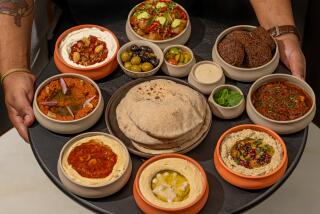What’s Brewing in Lebanon? American Beer : Mideast: It’s the newest attraction at a truck stop in the mountains near the famous grove of cedars.
- Share via
THE CEDARS, Lebanon — When a Shiite Muslim truck driver pulls into the Christian-run truck stop here, political differences are set aside over a cold bottle of American beer.
The truck stop, 6,300 feet up in the mountains and near Lebanon’s famous grove of cedars, has served truckers and tourists for 23 years. The newest attraction is a brand of beer out of Pittsburgh called “American.” Abu Youssef, who runs the place, can’t keep enough of it in stock.
The brew comes in a red, white and blue can with a picture of an American eagle, its wings extended in flight, clutching a flagstaff flying Old Glory.
The Shiite Muslims of Lebanon are often associated with hostage-taking, so the friendly Shiite truck drivers would be amused if they could read the English legend under the beer logo: “Quality brewed to capture the spirit and strength of America.”
Almost every day, between 50 and 75 trucks stop at Abu Youssef’s place, which is midway between Tripoli on the northern coast and Baalbek in the Bekaa Valley, a distance of 76 miles.
The trucks start at sea level and climb to Cedars Pass, elevation 8,690 feet, then descend into the valley. There, fruits and vegetables are repacked in refrigerated trailer trucks for shipment on to Saudi Arabia and the Persian Gulf emirates.
There are about 20 Syrian army and Christian militia checkpoints along the route, and they all impose a toll on the truckers. This is paid either in cash or in cucumbers or whatever the cargo happens to be.
The coastal plain is hot, the roads are in disrepair and often crowded with herds of goats that tend to ignore the trucks’ angry horns, and all this makes stopping here the high point of the drivers’ day.
Almost invariably, the drivers order a dish of hummus, a Lebanese dip, and a grilled meat sandwich along with a cold beer.
Until American beer appeared on the scene, most of the truckers chose Heineken, the Dutch beer, but “now everyone wants American,” Abu Youssef said the other day. He has canceled his longstanding order for Heineken.
He charges the equivalent of 60 cents a can for the beer. For Pepsi-Cola, the truckers’ favorite soft drink, he gets 50 cents.
After eating, a smoke is in order, and the truckers light up one of their favorite cigarettes, Marlboro or Lucky Strike. These sell for 60 cents and 30 cents a pack, respectively.
As they smoke and finish their beer, the radio describes the security situation in Beirut, where Muslims and Christians have been killing each other for more than a decade, and the Shiite drivers listen with the same concern as Abu Youssef. His fellow Lebanese Christians live in East Beirut, and many of the drivers have relatives in the southern suburbs of West Beirut, a Shiite enclave.
When a new face appears, the drivers stop talking, waiting for Abu Youssef’s standard joke: “You want a sandwich? With or without bread?”
Abu Youssef also likes to tell about how he learned of American beer, especially if there are Americans around to listen.
“One day a couple of summers ago, the Soviet ambassador was here in The Cedars on a picnic,” he says. “The ambassador came in and asked if I could keep his beer in my cooler. And what was the brand? American.”
The ambassador gave Abu Youssef a couple of cans as a way of saying thanks, but the canny merchant had already decided to put in an order for it. He knew that if an American product had the backing of the Soviet ambassador, it had to be good.
The ambassador speaks fluent Arabic but no English, so it is not likely that he could read the wording on the side of the can: “American beer is a tribute to the greatest nation on Earth, a land of freedom and opportunity.”
More to Read
Sign up for Essential California
The most important California stories and recommendations in your inbox every morning.
You may occasionally receive promotional content from the Los Angeles Times.













